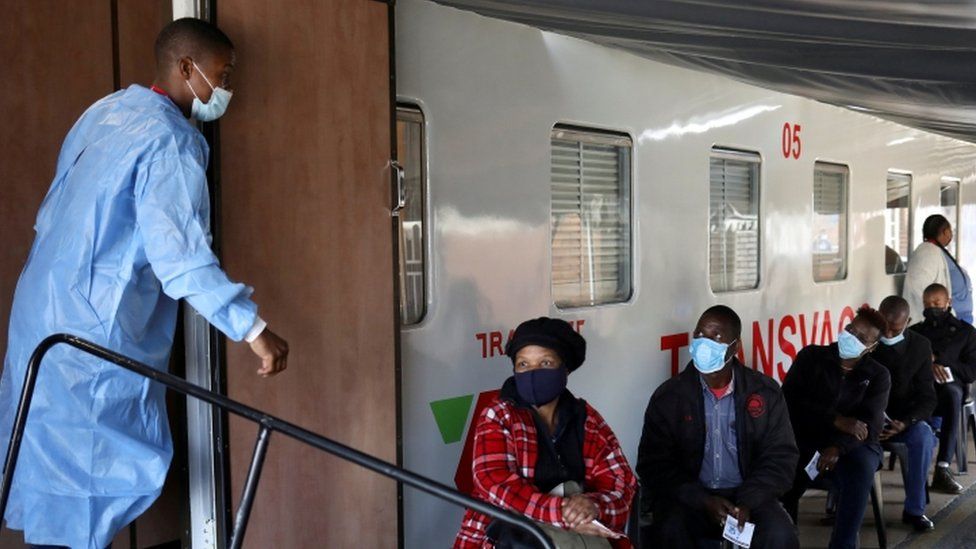
เมื่อวันศุกร์ที่แล้ว องค์การอนามัยโลกได้กำหนดให้อักษรกรีก omicron เป็นตัวแปร Covid ที่ระบุใหม่ในแอฟริกาใต้. ต่อไปนี้เป็นคำตอบเกี่ยวกับ Omicron Variant.
มันเรียกว่าอะไร?
ตัวแปรนี้เริ่มแรกเรียกว่า B.1.1.529, แต่เมื่อวันศุกร์ที่ผ่านมาก็ถูกกำหนดให้เป็นตัวแปรที่น่ากังวล (สารอินทรีย์ระเหยง่าย) โดยองค์การอนามัยโลกเนื่องจากการกลายพันธุ์ที่“ เกี่ยวข้อง” และเพราะ“ หลักฐานเบื้องต้นแสดงให้เห็นถึงความเสี่ยงที่เพิ่มขึ้นของการติดเชื้อใหม่กับตัวแปรนี้”. ระบบ WHO กำหนดตัวแปรดังกล่าวเป็นตัวอักษรกรีก, เพื่อให้ฉลากที่ไม่ได้มีการหยุดพักซึ่งไม่ได้เชื่อมโยงตัวแปรใหม่กับตำแหน่งที่ตรวจพบครั้งแรก. ตัวแปรใหม่ได้รับการเรียกว่า omicron.
ตรวจพบตัวแปร omicron ครั้งแรกเมื่อใด?
ตัวแปร B.1.1.529 ถูกระบุในวันอังคารและเน้นว่าเป็นข้อกังวลเนื่องจากการกลายพันธุ์จำนวนมาก, ซึ่งอาจนำไปสู่การหลบเลี่ยงภูมิคุ้มกัน. นอกจากนี้ยังเชื่อมโยงกับการเพิ่มขึ้นของจำนวนกรณีในจังหวัดกัวเต็งของแอฟริกาใต้, เขตเมืองที่มีพริทอเรียและโจฮันเนสเบิร์ก, ในช่วงสองสัปดาห์ที่ผ่านมา. These two factors put it quickly on the radar of international monitors, with the chief medical adviser to the UK Health and Security Agency describing the variant as the “most worrying we’ve seen”.
Where did it come from?
Although initially linked to Gauteng, the variant did not necessarily originate there. The earliest sample showing the variant was collected in Botswana on 11 พฤศจิกายน. Scientists say that the unusual constellation of mutations suggests it may have emerged during a chronic infection of an immunocompromised person, such as an untreated HIV/Aids patient.
Why are scientists worried about it?
The variant has more than 30 mutations on its spike protein – the key used by the virus to unlock our body’s cells – more than double the number carried by Delta. การเปลี่ยนแปลงที่น่าทึ่งดังกล่าวทำให้เกิดความกังวลว่าแอนติบอดีจากการติดเชื้อก่อนหน้านี้หรือการฉีดวัคซีนอาจไม่ตรงกับที่ดีอีกต่อไป. ขึ้นอยู่กับการรู้รายการการกลายพันธุ์อย่างหมดจด, นักวิทยาศาสตร์คาดหวังว่าไวรัสจะมีแนวโน้มที่จะติดเชื้อ - หรือ reinfect - คนที่มีภูมิคุ้มกันต่อสายพันธุ์ก่อนหน้านี้.
มันถ่ายโอนได้มากขึ้นหรือไม่?
นี่ยังไม่ชัดเจน แต่ภาพที่เกิดขึ้นใหม่กำลังกังวล. มีคดีจำนวนมากในแอฟริกาใต้จาก 273 คดีใน 16 พฤศจิกายนถึงมากกว่า 1,200 เมื่อเริ่มต้นสัปดาห์นี้. มากกว่า 80% ของเหล่านี้มาจากจังหวัดกัวเต็งและการวิเคราะห์เบื้องต้นแสดงให้เห็นว่าตัวแปรได้กลายเป็นความเครียดที่โดดเด่นอย่างรวดเร็ว. ค่า r, ซึ่งบ่งชี้ว่าการแพร่ระบาดของโรคกำลังเติบโตเร็วแค่ไหน, คาดว่าจะเป็น 1.47 สำหรับแอฟริกาใต้โดยรวม, แต่ 1.93 ในกัวเต็ง. มีโอกาสที่นี่เป็นสถิติ Blip ที่เชื่อมโยงกับเหตุการณ์ super-spreader แต่ข้อมูลได้ก่อให้เกิดข้อกังวลเพียงพอสำหรับมาตรการป้องกันไว้ก่อน.
วัคซีนที่มีอยู่จะทำงานกับมัน?
นักวิทยาศาสตร์มีความกังวลจากจำนวนการกลายพันธุ์และความจริงที่ว่าบางคนได้เชื่อมโยงกับความสามารถในการหลบเลี่ยงการป้องกันภูมิคุ้มกันที่มีอยู่แล้ว. นี่คือการคาดการณ์ทางทฤษฎี, แม้ว่า, และการศึกษากำลังดำเนินการอย่างรวดเร็วเพื่อทดสอบว่าแอนติบอดีอย่างมีประสิทธิภาพทำให้ตัวแปรใหม่เป็นกลาง. ข้อมูลในโลกแห่งความเป็นจริงเกี่ยวกับอัตราการติดเชื้อซ้ำจะให้ข้อบ่งชี้ที่ชัดเจนขึ้นในขอบเขตของการเปลี่ยนแปลงใด ๆ ในการสร้างภูมิคุ้มกัน.
นักวิทยาศาสตร์ไม่คาดหวังว่าตัวแปรจะไม่สามารถจดจำได้อย่างสิ้นเชิงกับแอนติบอดีที่มีอยู่เดิม, เพียงแค่วัคซีนในปัจจุบันอาจให้การป้องกันน้อยลง. ดังนั้นวัตถุประสงค์ที่สำคัญยังคงเพิ่มอัตราการฉีดวัคซีน, รวมถึงปริมาณที่สามสำหรับกลุ่มที่มีความเสี่ยง.
ยาที่มีอยู่แล้ว?
นักวิทยาศาสตร์คาดหวังว่ายาต้านไวรัสที่ได้รับอนุมัติเมื่อเร็ว ๆ นี้, เช่นยาของเมอร์ค, จะทำงานได้อย่างมีประสิทธิภาพกับตัวแปรใหม่เนื่องจากยาเหล่านี้ไม่ได้กำหนดเป้าหมายโปรตีนสไปค์ - พวกมันทำงานโดยการหยุดไวรัสจากการจำลองแบบ. อย่างไรก็ตาม, มีความเสี่ยงที่ยิ่งใหญ่กว่าที่โมโนโคโลนัลแอนติบอดี, เช่นการรักษาของ Regeneron, อาจล้มเหลวหรือล้มเหลวบางส่วนเนื่องจากเป้าหมายส่วนหนึ่งของไวรัสที่จะกลายพันธุ์.
ตัวแปรจะทำให้เกิด covid ที่รุนแรงมากขึ้น?
ยังไม่มีข้อมูลเกี่ยวกับว่าตัวแปรนำไปสู่การเปลี่ยนแปลงของอาการ covid หรือความรุนแรง - นี่คือสิ่งที่นักวิทยาศาสตร์แอฟริกาใต้จะติดตามอย่างใกล้ชิด. เนื่องจากมีความล่าช้าระหว่างการติดเชื้อและการเจ็บป่วยที่รุนแรงมากขึ้น, จะใช้เวลาหลายสัปดาห์ก่อนที่จะมีข้อมูลที่ชัดเจน. ในขั้นตอนนี้, นักวิทยาศาสตร์กล่าวว่าไม่มีเหตุผลที่ชัดเจนที่จะสงสัยว่าตัวแปรล่าสุดจะแย่ลงหรือรุนแรงขึ้น.
วัคซีนสามารถปรับแต่งได้และใช้เวลานานเท่าใด?
» คำถามที่พบบ่อย, ทีมงานที่อยู่เบื้องหลังวัคซีนกำลังทำงานเกี่ยวกับการปรับปรุงวัคซีนด้วยโปรตีน Spike ใหม่เพื่อเตรียมพร้อมสำหรับเหตุการณ์ที่จำเป็นต้องใช้เวอร์ชันใหม่.
การเตรียมงานจำนวนมากสำหรับการอัปเดตดังกล่าวเกิดขึ้นเมื่อสายพันธุ์เบต้าและเดลต้าเกิดขึ้น - แม้ว่าในกรณีเหล่านั้นวัคซีนที่มีอยู่จะจัดขึ้นได้ดี. ซึ่งหมายความว่าทีมวิจัยได้รับการทรงตัวเพื่อสร้างวัคซีนเวอร์ชันใหม่และได้หารือกับหน่วยงานกำกับดูแลว่าจะต้องมีการทดลองเพิ่มเติมเกี่ยวกับการทดลองเพิ่มเติม. อย่างไรก็ตาม, อาจใช้เวลาสี่ถึงหกเดือนก่อนที่จะอัปเดตวัคซีน, ถ้าจำเป็น, มีอยู่อย่างกว้างขวาง.
มีแนวโน้มที่จะแพร่กระจายไปทั่วโลก?
จนถึงตอนนี้, กรณีที่ได้รับการยืนยันส่วนใหญ่อยู่ในแอฟริกาใต้, ด้วยไม่กี่คนในบอตสวานาและฮ่องกง. มีการตรวจพบกรณีเพิ่มเติมในเย็นวันพฤหัสบดีที่อิสราเอล - บุคคลที่กลับมาจากมาลาวี - และอีกสองกรณีถูกสงสัยในประเทศ. ในวันศุกร์, เบลเยียมยืนยันว่าได้ตรวจพบคดีในคนที่เดินทางไปอียิปต์และตุรกี.
แต่ถึงอย่างไร, ระบุว่ามีการส่งผ่านชุมชนในแอฟริกาตอนใต้, หากมีข้อได้เปรียบในการส่งผ่านตัวแปรใหม่มีแนวโน้มที่จะแพร่กระจายไปยังประเทศอื่น ๆ.
ประสบการณ์ก่อนหน้านี้แสดงให้เห็นว่าการห้ามการเดินทางมีแนวโน้มที่จะซื้อเวลา, แต่, สั้น ๆ ของการใช้วิธีการที่ไม่มีการปิดด้วยการล็อคอย่างหนัก, มาตรการเหล่านี้ไม่น่าจะหยุดการแพร่กระจายของตัวแปรใหม่โดยสิ้นเชิง.
แหล่งที่มา: ผู้ปกครอง

















